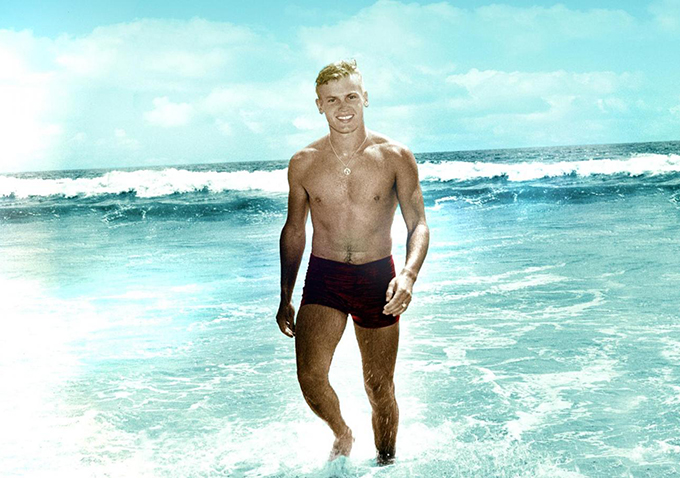 Tab Hunter was a teen idol in the mid 20th century: he starred in dozens of films, appeared on countless magazine covers and recorded the #1 pop song "Young Love" in 1957. Yet the entire time he was in the public eye, Hunter closely guarded his private identity as a gay man, even while engaging in fairly public relationships with "close friends" like Anthony Perkins (the tabloid Confidential threatened to expose his involvement in a "limp wristed pajama party" at the time). "Tab Hunter Confidential" is so enjoyable principally through many interviews with Hunter himself, who makes clear that he wasn’t a stereotypical tortured, self-loathing homosexual. He was an amazingly well adjusted, clean-cut kid who followed his gut and loved who he wanted to love; his behavior was quietly groundbreaking.
Tab Hunter was a teen idol in the mid 20th century: he starred in dozens of films, appeared on countless magazine covers and recorded the #1 pop song "Young Love" in 1957. Yet the entire time he was in the public eye, Hunter closely guarded his private identity as a gay man, even while engaging in fairly public relationships with "close friends" like Anthony Perkins (the tabloid Confidential threatened to expose his involvement in a "limp wristed pajama party" at the time). "Tab Hunter Confidential" is so enjoyable principally through many interviews with Hunter himself, who makes clear that he wasn’t a stereotypical tortured, self-loathing homosexual. He was an amazingly well adjusted, clean-cut kid who followed his gut and loved who he wanted to love; his behavior was quietly groundbreaking.
At the start of this documentary, which is based in part on a book of the same name that Hunter wrote with Eddie Muller, he seems reluctant to talk about his sexual history. "I’m an old man now —this is my life, big deal," Hunter shrugs. From there, director Jeffrey Schwarz nimbly charts Hunter’s life and career, using archival images and videos, including hilarious photographic magazine spreads that had Hunter engaging in banal activities like cleaning a window and longer editorial pieces about his date with Debbie Reynolds (who is interviewed here to engaging effect). It’s fascinating, spirited examination of how Hollywood used to function.
But the juiciest material details Hunter’s personal life; his relationship with a famous Olympic skater pales next to his romance with Perkins, who not only broke his heart but slighted him professionally (oddly enough, it’s not Hunter’s monogamous relationship with his longtime partner that serves as the heart of the film, but rather his tempestuous, closeted affair with Perkins.) Hunter was a massively famous teen idol, but nobody knew who he really was, and those who repeated whispers as to his homosexuality around Hollywood were quickly silenced by high powered lawyers and heavy-hitting studio execs (Hunter was contracted to and was thus a darling of Warner Bros., at least for a while). Hunter never took up drinking or drugs and his American-as-apple-pie, Eisenhower-era charm and good looks never wavered. It wasn’t even his private life that led to his career skydiving; it was his annoyance towards Warner Bros. for releasing him from his contract to shoot films for other studios. He ended his association with the studio, and he admits in the documentary that doing so was "career suicide."
Without the help of Warner Bros. and their platoon of shady employees who "kept things quiet," Hunter’s private life was discussed out in the open. Hunter, who never truly broke through to the mainstream (despite showy roles in some prestigious projects), was forced to beg for roles and star in crummy movies. A few years later, he was forced to join the dinner theater circuit and would later leave show business altogether. It’s clear from his early work that he was not a preternaturally gifted performer —his delivery is wooden and his physicality stiff. Even during a time where an "aw-shucks," square-jawed affect was common, he felt a little bit old fashioned; an antique being advertised as something brand new. As one interviewer in the documentary put it: "The publicity exceeded the product."
Some 50 years after his heyday, Tab Hunter is a cult icon, not only for those sensitive to the homoerotic subtext in his most aggressively heterosexual performances, but because he was the whole package: tanned, toned and wonderfully approachable. To a certain audience, he was perfect. Or as John Waters, who would cast Hunter in "Polyester," kicking off a minor career resurgence (during which he forged a close personal and working relationship with drag queen Divine), says in the documentary "he was amazing looking."
Hunter has shied away from the spotlight after that small, Waters-assisted career bump, living a quiet life with his longtime partner away from the spotlight. Even Clint Eastwood, who is interviewed briefly, seems impressed by his attitude and his subsequent life. Hunter plainly states that he’s "happy to be forgotten," but if "Tab Hunter Confidential" ensures that he will never be forgotten. His story is profoundly American.
Towards the end of the movie, Schwarz circles back to Perkins, who while widely known to be gay, maintained a conventional facade via a wife and kids It must have been torture. Hunter and Perkins made amends before Perkins died from AIDS, but you can still hear the hurt in Hunter’s voice, as well as gratitude that he didn’t live his life like that. "Tab Hunter Confidential" is fun and gossipy in the way that great documentaries about Hollywood often are, but it also speaks to a deeper truth about identity and perseverance and the large divide between one’s personal and professional life. Even if you have no idea who Tab Hunter is, this documentary is riveting and insightful. [A-]
Browse through all our coverage of the 2015 SXSW Film Festival by clicking here.

